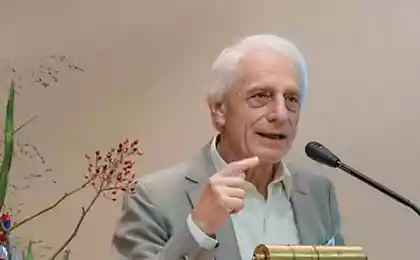1424
Too good to leave, too bad to stay
Human relationships are the most complex aspect of our lives, particularly long-term such as marriage. Your relationships can raise you to new heights, or conversely, lower to the bottom.
But what if you are stuck somewhere in the middle?
What if your relationship is good enough, say 7 on a 10-point scale. Whether you want to live on associated with these relationships? Or stop them and go in search, hoping to find something better?
Uncertainty is a disgusting condition.You are not confident in any solution. Perhaps what you have now is good enough and you do stupid, throwing it in search of a new relationship that you may never find. Or maybe you just saving your own ass from looking really satisfying relationship that will make you happy for the rest of your days. A really hard choice.
Sixty six million two hundred forty six thousand five hundred ninety one
Fortunately, there is a wonderful book that offers a painless way of coping with uncertainty in a relationship. It's called "Too good to leave, too bad to stay" by Mira Kirshenbaum (Mira Kirshenbaum). I read it many years ago and it completely changed my views on long-term relationships.
First of all, the book points to the wrong path of decision-making. The wrong way is to use the method of "cups" balance, trying to weigh the pros and cons of both decisions to leave and to stay. That's what makes each person in a similar situation. Weighing pros and cons seems logical, but it does not give you the right information needed for decision-making.
Every relationship has its pros and cons, so how would you know whether your relationships are destructive, or tolerable, or even wonderful? Your "for" telling you what should stay and "against" that need to go. In addition to this you must anticipate your future "for and against". How are you going to predict the future of your relationship? Who can say that current problems are temporary or permanent?
The decision kirschenbaum is to abandon the method of "Cup weights" and replace it with a diagnostic method. To accurately determine the state of your relationship, instead of trying to weigh them. This will give you the necessary information to make reasonable decisions, and you will know exactly the reasons for this decision. If you have uncertainty, then your relationship is not healthy. Therefore, to find and discover the true nature of this disease seems like a reasonable starting point.
Right diagnosis of your relationships, the author offers a set of 36 questions that you must answer "Yes" or "no". Each question is very detailed in a few pages. In fact, the diagnostic procedure is carried out for the entire book.
Each question is a sort of filter for your relationship. If you have passed the filter, skip to the next question. If you have not passed the filter, then get a recommendation to end this relationship. To get a recommendation to stay together, you must overcome all 36 filters. If at least one of the filters will be of you, your recommendation is to leave.
It's not as cruel as it sounds, though, because most of these filters will pass very easily. I suggest that of the 36 questions, less than a third require serious reflection. Hopefully you can pass filters like, "Your partner beats you?"and "does your partner move to live in another country without you?"without major problems. If not, then you don't need a book to understand that your relationship is rolling down an inclined plane.
Author's recommendation based on observation of the life of a large number of pairs after passing the test, who either remained together or went after painful state of uncertainty, caused by one of the 36 questions. The author watched as their relationship has varied over time. Do the people who made the choice to leave or stay, years later, that their decision was correct? If the couple stayed together, their relationship developed into something bigger or declined? And if the relationship was terminated, did the people new happiness or permanently sorry about the made choice?
I find this concept extremely valuable, like the ability to turn the page to see what will happen in the future.Although these recommendations are based on observations of the author and her professional opinion, I don't suggest you blindly follow them. However, personally, I find her insights very reasonable and don't find them surprising. I doubt you will be surprised to read that the relationship with the addict is almost always doomed to failure. What can you say about the relationship with the person you absolutely no respect? How about a long-term relationship with such a person? Or a relationship with a workaholic obsessed by the idea to tenfold your income? You wonder how these relationships will influence the decision of its tasks, if a couple will stay together or disperse?
Kirshenbaum explains that in all these cases, the gap recommends that, because most people who choose in a similar situation to stay together, were unhappy, while the rupture of relations could bring them happiness. Thus, happiness in the long term is a key priority, which implies the personal happiness of the decision maker, not its partner relations.
If you had to choose "too good to leave but too bad to stay", I highly recommend this book. You can easily sweep through most filters, but you'll probably be surprised that some of them will be a problem for you and make you think. I recommend this book not only to people who are unsure of the status of their relationship, as well as people with a healthy relationship, but wishing to make them even better. This book will help you identify the weak areas of your relationship that could lead to their collapse, will help you to realize them and to treat them with caution.
I offer you some defining paragraphs from this book that may seem important to you (note that this is only my summary, and not quoting the words of the author of the book):
If God or any priest will tell you that you should end the relationship, will you feel relieved, due to the fact that now I'll have to break up? If the only thing keeping you together is your religion, then your relationship is already dead. Swing-torture faith and choose happiness. If in your hearts there is nothing, then the physical living together, you will not deceive any one spirit person, as well as not deceive anyone around. Leave this hypocrisy and get out. It turns out you have to "expect" from your relationship without too much difficulty? If you make huge efforts to get what you want such a relationship brings more harm than good. Depart. Do you feel sincere sympathy to your partner and feel that you sincerely like him? If you have no mutual sympathy to one another, you are created to be together. Do you find your partner sexually attractive? If there are no high interest, then there is no reason to stay together. Does your partner things that make your relationship uncomfortable for you, and do you find it unable or unwilling to change? The result of this response is much more important than it seems. If you can't stand the antics of your partner, then either need to change it or cancel (to leave). For example, or you quit Smoking within a month or I'm leaving. Attempts to endure what can not be tolerated, will only crush your self-esteem and you will feel over and over again lose their power and become weaker. Do you see yourself when you look in the eyes of your partner? A metaphor... if you don't feel full compatibility with your partner, you will be better to find another partner. Respect you and your partner each other, as a person? No mutual respect – it's time to leave. Can you rely on your partner, does he support you (of course, if you need it)? If your partner is not making efforts to improve your life, and you won't be missing much if you leave, you should leave. Your relationship will fall apart anyway, but you get by finding someone else who will become your reliable protection and support. Whether your relationship is the basis for forgiveness? If you are able to forgive each other act, then, resentment is the step by step to displace love. Diverge. Whether you and your partner enjoy the time spent together? Attitude that isn't fun, is dead. Diverge. If you and your partner shared goals and shared dreams about the future? If you have no joint plans for the future, something in your relationship wrong. Stop them. These questions lead you to believe that your joint relationship should enhance your life, not Vice versa. At least you should be happier with this relationship than without them. Even if the breakup entails painful procedures and difficulties associated with the execution of the marriage contract. Kirschenbaum notes that in most cases, divorce is a step towards achieving happiness in the foreseeable future. At the same time remaining associated the relationship that is already dead, it is almost impossible to achieve happiness.
Many of the items on this diagnosis seem overly rigid from the point of view of the recommendations of the gap in situations that, in your opinion, can still be saved. Relationships, however, require efforts and commitments from both partners. Man alone will not achieve anything. Even taking into account that a miraculous healing is theoretically possible (for example, the cessation of offensive actions of one of the partners), such attempts are usually doomed to failure.
Even where the result is positive, it is necessary to pay a huge price so that ultimately you feel that the result was not worth the effort. You would be much happier building a new relationship (or even staying alone), instead of investing so much time and energy trying to save the relationship, dragging you down.
You can drastically improve the status of your relationship with the person more receptive to your suggestions and sincerely appreciate what you do for him. If you spend more effort to protect your relationship than just love, you should probably break up with this partner and dive into other relations, giving greater rewards for less work.
You can see that these diagnostic questions is applicable to a broader set of human relationships, such as your relationship with the boss and employees. Perhaps in this case you can skip the sexual attraction, but mutual respect, having fun, common goals, acceptance, gratification, etc. — all this applies to relations started on a career. For example, if your boss shies away from talking when you are trying to discuss with him his future in the company, I would say that this is a very bad sign for one of you.
Do not hesitate to ask yourself the question, not whether you put a point in their current relationship and seek new. If you make it clear what the current relationship need to stop, then stop them. Once you again become independent, you will immediately begin to develop the skills necessary to attract a new partner. It is unlikely that you will visit relevant places and contact with people who are potential partners for your new relationship, not yet finished with the old. In addition, for all others you seem to be unavailable, while bound by a previous relationship, so you will not be able to clearly assess the meaning of what is happening around you until, until you get rid of the past.
Three million eight hundred eighty nine thousand one hundred fifty eight
The results of the diagnosis may also convince you that your relationship is actually too good to stop. This situation can last for your entire life, and maybe at some point change. Not in your government to keep everything under control. But at least you will have the method to help you decide whether you continue the current relationship or it is time to stop them.
Whatever your chosen relationships, they, at least, should make you happier. published
© Steve Pavlina
P. S. And remember, only by changing their consumption — together we change the world! ©
Join us in Facebook , Vkontakte, Odnoklassniki
Source: www.allstevepavlina.ru/how-to-decide-when-to-end-a-long-term-relationship
But what if you are stuck somewhere in the middle?
What if your relationship is good enough, say 7 on a 10-point scale. Whether you want to live on associated with these relationships? Or stop them and go in search, hoping to find something better?
Uncertainty is a disgusting condition.You are not confident in any solution. Perhaps what you have now is good enough and you do stupid, throwing it in search of a new relationship that you may never find. Or maybe you just saving your own ass from looking really satisfying relationship that will make you happy for the rest of your days. A really hard choice.
Sixty six million two hundred forty six thousand five hundred ninety one
Fortunately, there is a wonderful book that offers a painless way of coping with uncertainty in a relationship. It's called "Too good to leave, too bad to stay" by Mira Kirshenbaum (Mira Kirshenbaum). I read it many years ago and it completely changed my views on long-term relationships.
First of all, the book points to the wrong path of decision-making. The wrong way is to use the method of "cups" balance, trying to weigh the pros and cons of both decisions to leave and to stay. That's what makes each person in a similar situation. Weighing pros and cons seems logical, but it does not give you the right information needed for decision-making.
Every relationship has its pros and cons, so how would you know whether your relationships are destructive, or tolerable, or even wonderful? Your "for" telling you what should stay and "against" that need to go. In addition to this you must anticipate your future "for and against". How are you going to predict the future of your relationship? Who can say that current problems are temporary or permanent?
The decision kirschenbaum is to abandon the method of "Cup weights" and replace it with a diagnostic method. To accurately determine the state of your relationship, instead of trying to weigh them. This will give you the necessary information to make reasonable decisions, and you will know exactly the reasons for this decision. If you have uncertainty, then your relationship is not healthy. Therefore, to find and discover the true nature of this disease seems like a reasonable starting point.
Right diagnosis of your relationships, the author offers a set of 36 questions that you must answer "Yes" or "no". Each question is very detailed in a few pages. In fact, the diagnostic procedure is carried out for the entire book.
Each question is a sort of filter for your relationship. If you have passed the filter, skip to the next question. If you have not passed the filter, then get a recommendation to end this relationship. To get a recommendation to stay together, you must overcome all 36 filters. If at least one of the filters will be of you, your recommendation is to leave.
It's not as cruel as it sounds, though, because most of these filters will pass very easily. I suggest that of the 36 questions, less than a third require serious reflection. Hopefully you can pass filters like, "Your partner beats you?"and "does your partner move to live in another country without you?"without major problems. If not, then you don't need a book to understand that your relationship is rolling down an inclined plane.
Author's recommendation based on observation of the life of a large number of pairs after passing the test, who either remained together or went after painful state of uncertainty, caused by one of the 36 questions. The author watched as their relationship has varied over time. Do the people who made the choice to leave or stay, years later, that their decision was correct? If the couple stayed together, their relationship developed into something bigger or declined? And if the relationship was terminated, did the people new happiness or permanently sorry about the made choice?
I find this concept extremely valuable, like the ability to turn the page to see what will happen in the future.Although these recommendations are based on observations of the author and her professional opinion, I don't suggest you blindly follow them. However, personally, I find her insights very reasonable and don't find them surprising. I doubt you will be surprised to read that the relationship with the addict is almost always doomed to failure. What can you say about the relationship with the person you absolutely no respect? How about a long-term relationship with such a person? Or a relationship with a workaholic obsessed by the idea to tenfold your income? You wonder how these relationships will influence the decision of its tasks, if a couple will stay together or disperse?
Kirshenbaum explains that in all these cases, the gap recommends that, because most people who choose in a similar situation to stay together, were unhappy, while the rupture of relations could bring them happiness. Thus, happiness in the long term is a key priority, which implies the personal happiness of the decision maker, not its partner relations.
If you had to choose "too good to leave but too bad to stay", I highly recommend this book. You can easily sweep through most filters, but you'll probably be surprised that some of them will be a problem for you and make you think. I recommend this book not only to people who are unsure of the status of their relationship, as well as people with a healthy relationship, but wishing to make them even better. This book will help you identify the weak areas of your relationship that could lead to their collapse, will help you to realize them and to treat them with caution.
I offer you some defining paragraphs from this book that may seem important to you (note that this is only my summary, and not quoting the words of the author of the book):
If God or any priest will tell you that you should end the relationship, will you feel relieved, due to the fact that now I'll have to break up? If the only thing keeping you together is your religion, then your relationship is already dead. Swing-torture faith and choose happiness. If in your hearts there is nothing, then the physical living together, you will not deceive any one spirit person, as well as not deceive anyone around. Leave this hypocrisy and get out. It turns out you have to "expect" from your relationship without too much difficulty? If you make huge efforts to get what you want such a relationship brings more harm than good. Depart. Do you feel sincere sympathy to your partner and feel that you sincerely like him? If you have no mutual sympathy to one another, you are created to be together. Do you find your partner sexually attractive? If there are no high interest, then there is no reason to stay together. Does your partner things that make your relationship uncomfortable for you, and do you find it unable or unwilling to change? The result of this response is much more important than it seems. If you can't stand the antics of your partner, then either need to change it or cancel (to leave). For example, or you quit Smoking within a month or I'm leaving. Attempts to endure what can not be tolerated, will only crush your self-esteem and you will feel over and over again lose their power and become weaker. Do you see yourself when you look in the eyes of your partner? A metaphor... if you don't feel full compatibility with your partner, you will be better to find another partner. Respect you and your partner each other, as a person? No mutual respect – it's time to leave. Can you rely on your partner, does he support you (of course, if you need it)? If your partner is not making efforts to improve your life, and you won't be missing much if you leave, you should leave. Your relationship will fall apart anyway, but you get by finding someone else who will become your reliable protection and support. Whether your relationship is the basis for forgiveness? If you are able to forgive each other act, then, resentment is the step by step to displace love. Diverge. Whether you and your partner enjoy the time spent together? Attitude that isn't fun, is dead. Diverge. If you and your partner shared goals and shared dreams about the future? If you have no joint plans for the future, something in your relationship wrong. Stop them. These questions lead you to believe that your joint relationship should enhance your life, not Vice versa. At least you should be happier with this relationship than without them. Even if the breakup entails painful procedures and difficulties associated with the execution of the marriage contract. Kirschenbaum notes that in most cases, divorce is a step towards achieving happiness in the foreseeable future. At the same time remaining associated the relationship that is already dead, it is almost impossible to achieve happiness.
Many of the items on this diagnosis seem overly rigid from the point of view of the recommendations of the gap in situations that, in your opinion, can still be saved. Relationships, however, require efforts and commitments from both partners. Man alone will not achieve anything. Even taking into account that a miraculous healing is theoretically possible (for example, the cessation of offensive actions of one of the partners), such attempts are usually doomed to failure.
Even where the result is positive, it is necessary to pay a huge price so that ultimately you feel that the result was not worth the effort. You would be much happier building a new relationship (or even staying alone), instead of investing so much time and energy trying to save the relationship, dragging you down.
You can drastically improve the status of your relationship with the person more receptive to your suggestions and sincerely appreciate what you do for him. If you spend more effort to protect your relationship than just love, you should probably break up with this partner and dive into other relations, giving greater rewards for less work.
You can see that these diagnostic questions is applicable to a broader set of human relationships, such as your relationship with the boss and employees. Perhaps in this case you can skip the sexual attraction, but mutual respect, having fun, common goals, acceptance, gratification, etc. — all this applies to relations started on a career. For example, if your boss shies away from talking when you are trying to discuss with him his future in the company, I would say that this is a very bad sign for one of you.
Do not hesitate to ask yourself the question, not whether you put a point in their current relationship and seek new. If you make it clear what the current relationship need to stop, then stop them. Once you again become independent, you will immediately begin to develop the skills necessary to attract a new partner. It is unlikely that you will visit relevant places and contact with people who are potential partners for your new relationship, not yet finished with the old. In addition, for all others you seem to be unavailable, while bound by a previous relationship, so you will not be able to clearly assess the meaning of what is happening around you until, until you get rid of the past.
Three million eight hundred eighty nine thousand one hundred fifty eight
The results of the diagnosis may also convince you that your relationship is actually too good to stop. This situation can last for your entire life, and maybe at some point change. Not in your government to keep everything under control. But at least you will have the method to help you decide whether you continue the current relationship or it is time to stop them.
Whatever your chosen relationships, they, at least, should make you happier. published
© Steve Pavlina
P. S. And remember, only by changing their consumption — together we change the world! ©
Join us in Facebook , Vkontakte, Odnoklassniki
Source: www.allstevepavlina.ru/how-to-decide-when-to-end-a-long-term-relationship
The demand for products in various types of food
Spaghetti from zucchini with feta cheese and pesto sauce























